
Let’s catch on some non-coronavirus research today with an interesting approach against a very bad disease, metastatic colon cancer. This new paper (from groups at Virginia Tech and Wake Forest) adds to our understanding of something that’s been noticed for some time: colon cancer tissue is often infected with Fusobacterium nucleatus. This bacterium (an anaerobic Gram-negative beast) especially seems to be associated with accelerating or metastatic disease, but it’s been unclear what the relationship is. Is this an accident, or is there a causal effect – and if so, what causes what? F. nucleatus, I should note, is already known as a problem: it’s normally considered one of the major players in peridontal disease and (weirdly) may also have an as-yet-unexplained relationship with preterm births and other complications of pregnancy.
Using the well-known HCT116 colon-cancer cell line, this paper shows that the bacteria bind to the cell membrane and actually force their way into the cells themselves. There’s a good amount of work in the paper going into just what surface proteins are involved in this process and what the entry mechanism might be, but I’m going to skip ahead to what happens after the infection: the cells start to secrete significant quantities of the cytokines IL-8 and CXCL1, as measured floating around in the culture medium. And that’s not good news, because both of those have already been shown to be associated with colon cancer progression and invasiveness.
That’s just what this group saw in their cell culture: as the amounts of these cytokines increased, the cells became more mobile and less attached to their original positions. And the mobile ones weren’t just the cells that had the bacteria inside their cytoplasm: the cytokine secretion meant that cells that weren’t infected at all felt the effects and became more mobile themselves. The entry into the cells is a key part of the process, though – the paper shows that when key surface proteins were knocked out (blocking the whole entry process) that the cytokines don’t get secreted like this.
So it appears that the relationship is indeed causal, and it’s the bacterial infection that makes colon cancer worse. That immediately suggests some therapeutic options, of course. The paper shows that administering antisera (a mixture of antibodies) to F. nucleatum in the cell assay decreased this whole process, but did not eliminate it entirely. But what if you were to take it out of commission before it even got to the colon? The belief, in both colon cancer and pregnancy complications, is that the bacterium migrates from the mouth into the bloodstream (bleeding gums) and from there into other organs. A vaccine against it could potentially clear it from the blood before it has a chance to cause trouble later on. Given this species’ association with human disease, this sounds like it could be a good idea, and I hope that it’s taken up. More immediately, this bacterium seems to respond to a number of well-known antibiotics, and you have to wonder if treatment with those might improve outcomes in early-stage colon cancer. The problem there is, of course, that you don’t often even catch it early enough, but in patients who are diagnosed with non-metastatic disease it might be worth a look.
As a side note – gotta work in some coronavirus-related content somehow – it has been reported that our old friend chloroquine might inhibit colon cancer cell mobility in vitro. This paper found, though, that it doesn’t appear to do this through effects on this F. nucleatus-driven pathway – treatment with chloroquine didn’t make secretion of the two cytokines go down at all. So there’s another mechanism at work here. . .
